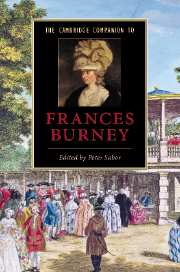Book contents
- Frontmatter
- Introduction
- 1 The Burney family
- 2 Evelina and Cecilia
- 3 Camilla and The Wanderer
- 4 Burney as dramatist
- 5 Journals and letters
- 6 Burney and politics
- 7 Burney and gender
- 8 Burney and society
- 9 Burney and the literary marketplace
- 10 The afterlife and further reading
- Further reading
- Index
- Series List
3 - Camilla and The Wanderer
Published online by Cambridge University Press: 28 September 2007
- Frontmatter
- Introduction
- 1 The Burney family
- 2 Evelina and Cecilia
- 3 Camilla and The Wanderer
- 4 Burney as dramatist
- 5 Journals and letters
- 6 Burney and politics
- 7 Burney and gender
- 8 Burney and society
- 9 Burney and the literary marketplace
- 10 The afterlife and further reading
- Further reading
- Index
- Series List
Summary
Do Burney's fictional representations of ineffectual mentors, impracticable conduct book advice, and the social artifice that is required of women constitute a critique of her society? If so, this aspect of her fiction seems to have eluded her original critics, since they praise Burney for purveying 'instructive' and 'illustrating' sentiments in all four of her novels. Even The Wanderer, which was pilloried both by the Tory critic John Wilson Croker and by the liberal William Hazlitt for its Francophilia, its stylistic misdemeanours, and its flagging creative energy, was not branded a radical novel, although as one of Burney's recent biographers observes, it contained 'an astringent exposé of Regency Britain'. On the surface at least, Camilla (1796) and The Wanderer (1814) promote a conservative moral agenda as regards female conduct, social class and feminine identity. Yet it is also true that both novels feature numerous moments of gender construction and disintegration, as well as reflecting contemporary anxieties about the impossibility of interpersonal knowledge in a society where social and moral protocols govern every aspect of conduct and desire. In Camilla, the gender distinctions and ideals that eighteenth- and nineteenth-century moralists take for granted are overtly endorsed even as they prove to be unsustainable for the heroine and for the novel's gender-ambiguous characters.
- Type
- Chapter
- Information
- The Cambridge Companion to Frances Burney , pp. 39 - 54Publisher: Cambridge University PressPrint publication year: 2007
- 2
- Cited by

